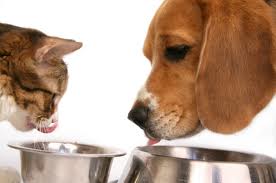
Recently through the Animal Clinic of Brooklin’s reception staff we have been getting a lot of inquiries regarding pet foods and what clients should be feeding their pets. I thought that I could help with a few of the myths and recent claims that some foods are making and help you make an informed choice about the food that you feed your pets.
Two claims that have been around forever are the holistic and organic labeled food. Something everyone should know is that just because your pet food has holistic and organic on their label doesn’t always mean that’s what it is. There is no organization that monitors the label claims of “holistic and organic” foods by food companies. Which means your food could say it is holistic and, in turn, not even be close. I am not saying that all foods with this claim are not true, but when a lot of clients come in with the food packaging we find many are not organic or holistic.
Some people are also making the assumption that the more you pay for a food the better it is. But the only thing that comes to mind for me is the old saying it’s not quantity it’s quality. It’s not the price you pay for the food but what you get for the money you paid. Again not saying that all higher priced pet foods are not good quality food, but you can’t go for the most expensive and believe it’s the best without being informed as to what is in the food, more so then what the label says.
A big trend I’ve seen lately with pet food is the “all life stages”… there is no way that any company can make a food that is well made for all life stages. You can’t survive on milk the way you did as a baby, so how can your adult dog life on a puppy food. An “all life stages” food is generally a puppy/kitten food. Normally those foods have higher fat and protein content, which can cause obesity and kidney problems in older animals, because their bodies can’t digest and filter these components like they did when they were younger. Similar to us as we can’t eat as we did when we were teenagers… I don’t know about you guys but that is true for me.
A big claim that is around is that dogs need to eat like wolves… meat all the time, uncooked and straight from the butcher. Yes this means I’m talking about RAW diets. What some people don’t get is that dogs are not true carnivores… they’re omnivores, even wolves. In the wild wolves do eat raw meat but they also eat vegetation (berries, grasses, grains, ect.). And they eat meat raw because that is what they have adapted too; domesticated dogs are not use to surviving on raw meats. And yes out there are homemade diets which you can do as a pet owner. But those diets aren’t just throwing your dog a steak and that’s all they get. Those diets have to be balanced with carbs, protein, fats and vitamins and minerals, not just protein by it’s self. And if that’s how you choose to feed your dog, a homemade diet, there are many resources through your veterinarian that you can look in to.
This now brings me to my all time favorite myth floating around about pet foods regarding “by-products”. I would like to put it out there do you really know what an animal by-product is… Animal by-produces are pieces of that animal that can still be good for your pet like hearts, livers, and things along that nature. But I bet you that the word by-product made you go straight to “hot dog meat”. By-products in a high quality food that come from a quality source are not bad for you pet when done in acceptable qualities. With all the advertising out there it makes by-products seem like the worst thing that you can be giving to your pet and that isn’t always the case. Some of the “no by-product” foods are really not a healthy choice for your pet. Again it comes down to being informed about what your pet is truly eating
The number one thing that pet owners need to do is ask question about what you are feeding your pet. Most companies have hotlines or email where you can write in and ask them questions regarding the food. And I know it seems very easy to ask that cheerful pet store employee what food is the best for your pet… but just take a moment to think… have they studied pet nutrition ever… do they have the knowledge about the quality of the foods to help you make an informed decision… I ask myself this question every time I’m in a pet store and see these new pet parents asking “What should I feed my puppy/kitten?”
